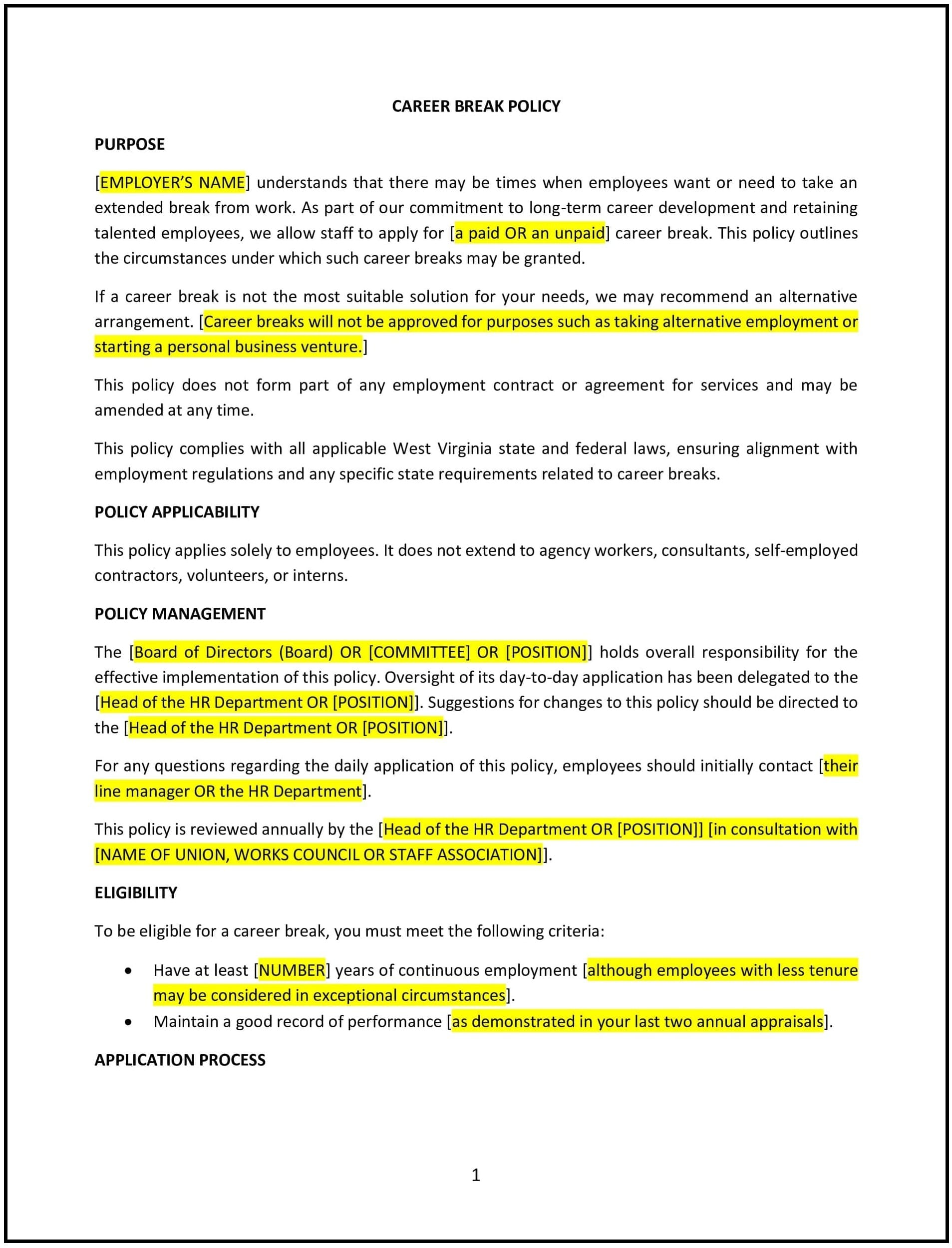Got contracts to review? While you're here for policies, let Cobrief make contract review effortless—start your free review now.

Customize this template for free
Career break policy (West Virginia)
A career break policy helps West Virginia businesses provide employees with the opportunity to take an extended leave of absence for personal reasons, such as pursuing education, traveling, caring for a family member, or addressing personal health needs. This policy outlines the eligibility criteria, application process, and guidelines for taking a career break, ensuring that employees are supported while maintaining business continuity.
By implementing this policy, businesses can enhance employee retention, provide work-life balance, and foster a supportive and flexible workplace culture.
How to use this career break policy (West Virginia)
- Define eligibility: Clearly specify who is eligible for a career break, such as full-time employees who have been with the company for a certain period, and any other requirements, such as performance reviews or departmental needs.
- Set the duration: Establish the maximum length of a career break, whether it is a fixed period (e.g., 6 months, 1 year) or flexible based on the employee’s needs and business requirements.
- Outline the application process: Provide clear steps for applying for a career break, including who to contact, the required documentation (e.g., reason for leave), and the notice period needed for approval.
- Address compensation: Specify whether employees will receive compensation during their career break, if applicable, or if the leave will be unpaid.
- Detail job protection: Clarify whether employees are guaranteed to return to the same or a similar position after their career break and how the company will ensure their role is protected during their absence.
- Address benefits: Explain whether employee benefits, such as health insurance or retirement contributions, will continue during the career break or if employees will be required to make arrangements to maintain coverage.
- Set guidelines for communication: Specify expectations for communication during the career break, such as staying in touch with HR or the direct manager for periodic updates, if needed.
Benefits of using this career break policy (West Virginia)
This policy offers several benefits for West Virginia businesses:
- Enhances employee retention: Offering career breaks as part of the employee benefits package encourages employees to stay with the company long term, as they are provided with flexibility for personal matters.
- Supports work-life balance: Provides employees with the time and flexibility to address personal needs, which can improve morale, reduce burnout, and enhance productivity upon their return.
- Attracts top talent: Companies offering career breaks as part of their benefits package can attract a wider pool of talent, especially among those seeking flexible work arrangements.
- Increases job satisfaction: Employees who feel supported in taking a career break are more likely to return with renewed energy and commitment, contributing positively to workplace culture.
- Reduces turnover costs: By allowing employees to take time off rather than leaving the company, businesses can avoid the costs of recruiting and training new employees.
Tips for using this career break policy (West Virginia)
- Communicate the policy clearly: Ensure all employees are aware of the career break policy and understand the guidelines, including eligibility, application procedures, and benefits.
- Ensure flexibility: Offer flexibility in how career breaks are structured to accommodate the different needs of employees, whether for personal development, health reasons, or family care.
- Plan for coverage: Develop a strategy for managing the workload during an employee’s absence, such as redistributing responsibilities or temporarily hiring staff to fill the role.
- Keep records: Track career breaks and ensure that employees comply with the terms of the leave, including the duration and return-to-work expectations.
- Review regularly: Periodically review the policy to ensure it remains aligned with business needs, employee feedback, and changes in West Virginia laws or company practices.